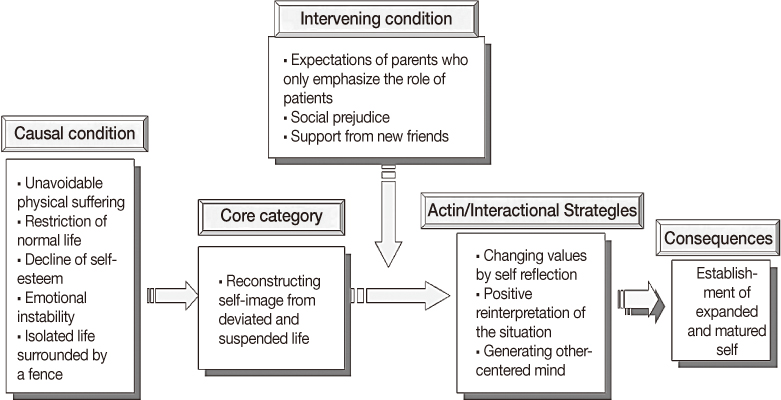Articles
- Page Path
- HOME > J Korean Acad Nurs > Volume 41(5); 2011 > Article
-
Original Article
- Illness Experience of Adolescents with Hematologic Malignancies
- Sun Young Son
-
Journal of Korean Academy of Nursing 2011;41(5):603-612.
DOI: https://doi.org/10.4040/jkan.2011.41.5.603
Published online: October 31, 2011
Transplant Coordinator, Yonsei University College of Medicine, Gangnam Severance Hospital, Seoul, Korea.
- Address reprint requests to: Son, Sun Young. Transplant Coordinator, Yonsei University College of Medicine, Gangnam Severance Hospital, 712 Eonjuro, Gangnam-gu, Seoul 135-720, Korea. Tel: +82-2-20196-1265, FAX: +82-2-2019-4827, Childnurse@hanmail.net
• Received: April 2, 2009 • Accepted: October 24, 2011
© 2011 Korean Society of Nursing Science
Figure & Data
REFERENCES
Citations
Citations to this article as recorded by 

- Development and psychometric properties of the social adjustment scale for youth cancer survivors in South Korea
Sumi Oh, Hyejung Lee, Sue Kim, Sanghee Kim, Chuhl Joo Lyu, Chang Gi Park, Hyoung Jin Kang
Asia-Pacific Journal of Oncology Nursing.2023; 10(7): 100241. CrossRef - Parents’ Perception of Self-Management Behaviors for Their Children With Spina Bifida in South Korea: A Qualitative Study
Hyun Jung Yun, Eun Kyoung Choi, Sang Won Han
Rehabilitation Nursing.2021; 46(2): 73. CrossRef - Health-related Quality of Life of Children and Adolescents after Hematopoietic Stem Cell Transplantation
Yu Min Hwang, Kyung-Sook Bang
Child Health Nursing Research.2020; 26(4): 402. CrossRef - Posttraumatic Growth of Adolescents with Childhood Leukemia and their Parents
Sungsil Hong, Ho Ran Park, Sun Hee Choi
Child Health Nursing Research.2019; 25(1): 9. CrossRef - Measurement Properties of Self-Report Questionnaires Measuring the Social Adjustment for Youth after Treatment of Childhood Cancer: Systematic Review
Su-Mi Oh, Sun-Young Park, Hye-Jung Lee, Ju Hee Lee
Child Health Nursing Research.2018; 24(1): 78. CrossRef - The Illness Adaptation Process of Patients Suffering from Myelodysplastic Syndrome (MDS): Doing My Best in Uncertainty
Ae-Kyung Kim
Korean Journal of Adult Nursing.2017; 29(5): 472. CrossRef - Predictors of Resilience in Adolescents with Leukemia
Sung Sil Hong, Ho Ran Park
Journal of Korean Academy of Nursing.2015; 45(4): 595. CrossRef - Impact of psychological and cancer-related factors on HRQoL for Korean childhood cancer survivors
Myung Ah Rhee, Kyong Mee Chung, Yuri Lee, Hana K. Choi, Jung Woo Han, Hyo Sun Kim, Sun Hee Kim, Yoon Jung Shin, Chuhl Joo Lyu
Quality of Life Research.2014; 23(9): 2603. CrossRef
Illness Experience of Adolescents with Hematologic Malignancies

Figure 1
Adjustment process of Korean adolescents to hematologic malignancies.
Figure 1
Illness Experience of Adolescents with Hematologic Malignancies
The Characteristics of Participants
Table 1
The Characteristics of Participants
 KSNS
KSNS
 E-SUBMISSION
E-SUBMISSION


 Cite
Cite

